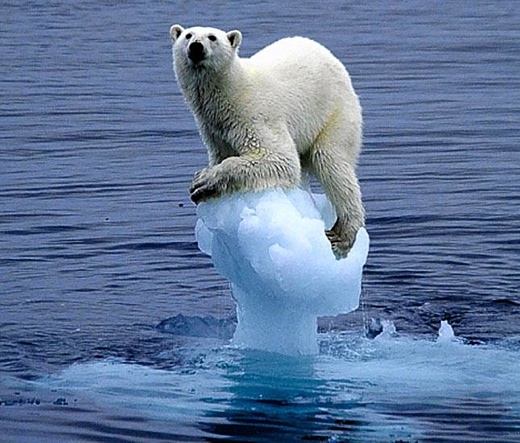 Image above: Polar bear's fate. From several sites including (http://greatgreenbe.wordpress.com/2011/12/09/frozen-planet/).
In a letter to Ernest de Chabrol dated 9 June 1831, Alexis de Tocqueville wrote: “As one digs deeper into the national character of the Americans, one sees that they have sought the value of everything in this world only in the answer to this single question: how much money will it bring it?”
Image above: Polar bear's fate. From several sites including (http://greatgreenbe.wordpress.com/2011/12/09/frozen-planet/).
In a letter to Ernest de Chabrol dated 9 June 1831, Alexis de Tocqueville wrote: “As one digs deeper into the national character of the Americans, one sees that they have sought the value of everything in this world only in the answer to this single question: how much money will it bring it?” Nearly two hundred years later, de Tocqueville has been vindicated not only as a superb social critic but also as a forecaster. Knowing nothing about de Tocqueville, the ten-year-old son of a friend put his own spin on recent history: “Mom, I think people value Father Time more than they value Mother Earth.” His words sting me like freezing rain, squeezing tears from the corners of my eyes. There’s nothing new there for me, except the perspective of youth: I often weep when I think about the hellishly overheated world we’re leaving him and his young friends. We’re destroying this world in large part because we care more about chasing fiat currency than we care about the living planet and its occupants.
Although it seems unlikely they met, de Tocqueville was writing during the time of the Danish philosopher Søren Kierkegaard. As if he, too, could see the future, Kierkegaard was plagued with anxiety. However, Kierkegaard didn’t call anxiety a plague: As he pointed out, anxiety is fundamental to our sense of humanity. Although I’m tempted to discard Kierkegaard’s every thought based simply on his ludicrous leap of faith, I can’t convince myself to disagree with him about anxiety. His writings about anxiety resonate with me as strongly as anything I’ve read by Lao Tzu, Schopenhauer, or Leopold.
It’s small wonder I’ve slept so poorly since August of 1979, when I reached a vague, subconscious understanding of the dire straits in which humanity is immersed. More than three decades after that summer of my nineteenth year, “my distress is enormous, boundless,” and growing by the day. I envy those who know about ongoing climate change and yet can remain comfortable with that knowledge. If you’re among them, perhaps this essay will drag you with me, into the abyss of despair. If so, I encourage you to abide the prescient words of Edward Abbey: “Action is the antidote to despair.”
According to NASA, anthropogenic climate change is primarily due to human actions. The ongoing crisis is intensifying, and much of North America is experiencing summer in March. Ninety degrees in winter is not normal, climate-change deniers notwithstanding. Ditto for this year’s Silent Spring.
If you’re under the age of 35, you’ve never experienced “normal” temperatures despite a weakening sun. In fact, February 1985 was the last time global mean monthly average was below the twentieth-century average. Already, climate has shifted to a new state. That state can only be described as dire. And yet because Earth’s climate system behaves in a nonlinear manner, future changes could occur very rapidly, making it seem as if more than three decades without a below-normal temperature reading were the good ol’ days.
What does the future hold? First, a warning: Abandon hope all ye who enter here.
A global average rise in temperature of 2 C is now optimistic, according to French scientists. Climatologist Matthew Huber agrees. But even that seemingly modest increase in temperature raises sea level 40 to 70 feet. Meanwhile, the OECD concludes we’re headed for an average temperature increase of 3-6 degrees Celsius by 2050 (full original report is here). Supporting documentation is far more abundant than revealed by these recent headlines:
- Climate change is shaking the world, literally
- Global warming borders close to being irreversible, according to conservative scientists
- Greenland’s ice will melt at a much lower temperature than previously estimated
- It might be irreversible already
- The Arctic death spiral continues unabated
- After all, a carbon time bomb has been dropped in the Arctic
- At the other pole, an iceberg the size of New York state is about to break away from Antarctica
- For many years, people have been metaphorically stealing glaciers to put into cocktails. Now they’re literally doing it.
- Habitat for millions of people will disappear with flooding from the oceans
- Water, water, everywhere, but the world’s rivers are failing to make it all the way to the oceans
- Oceans are acidifying at an ‘unparalleled’ rate, and will not survive
business-as-usualdisaster-as-usual - Conveyor belt tipping point has been reached, as I pointed out in this space more than a year ago
- As I also pointed out, at the same time under slightly different name, ‘Compost bomb’ is latest climate change ‘tipping point’
- Meanwhile, drought in the southwestern United States is intensifying even as U.S. heat waves are set to intensify from New York to Los Angeles
- According to tables of flowering dates in 1840s Massachusetts, average temperature already has risen 2.4 C in Concord since the industrial revolution began
- Elsewhere in the United States, the heat is unprecedented, with 7,000 record high temperatures so far this year
- A vital species of tree killed by climate change brings to mind one my favorite lines from Derrick Jensen: “Forests greet us and deserts dog our heels”
- The abundance of dire information and a slow news days causes even ABC “News” to point out the weather weirding
No comments :
Post a Comment